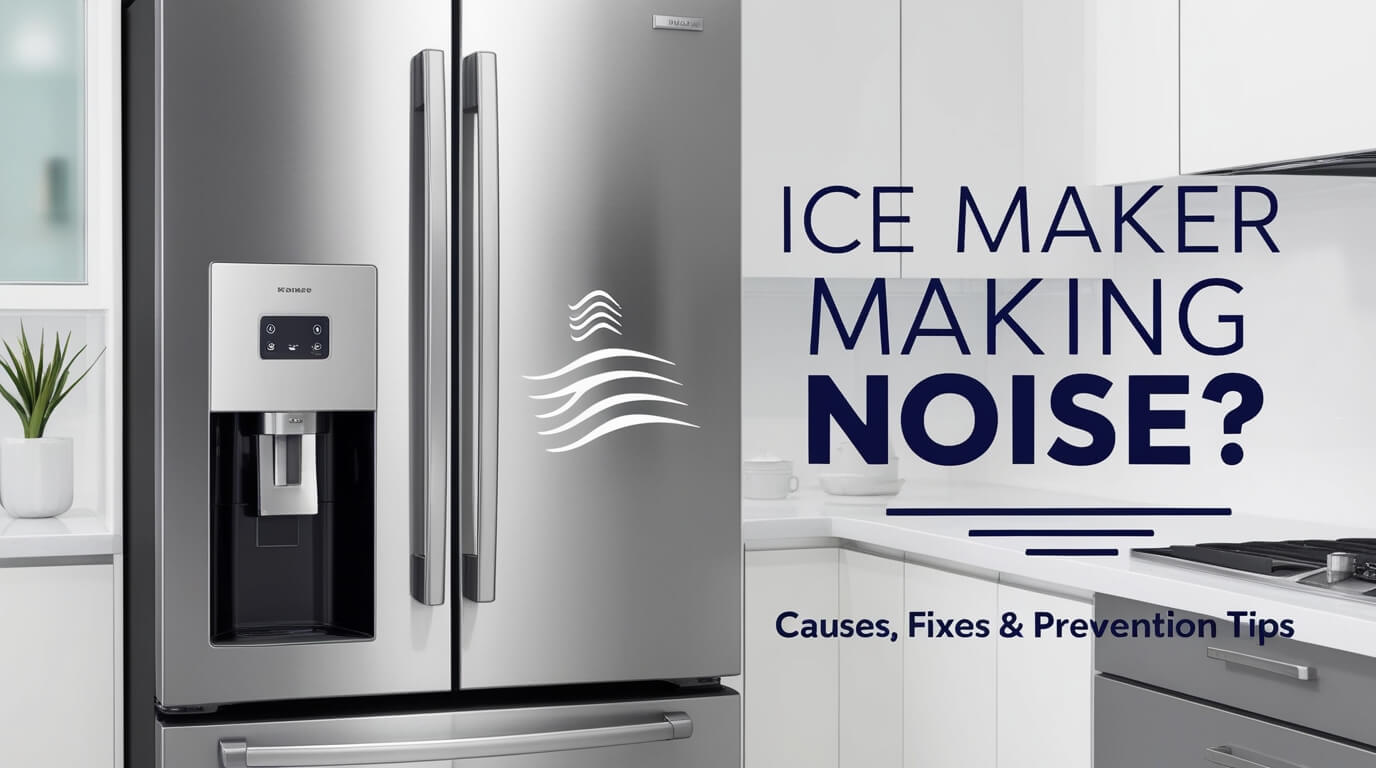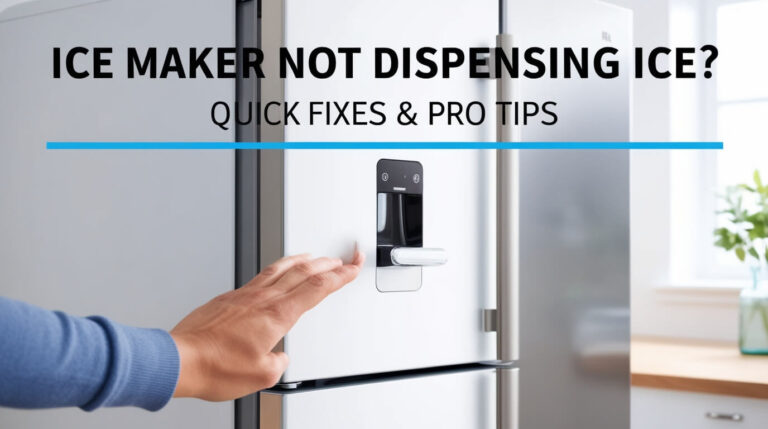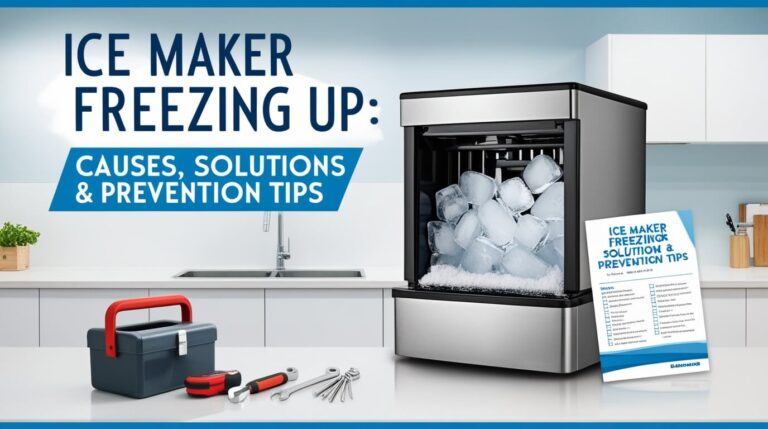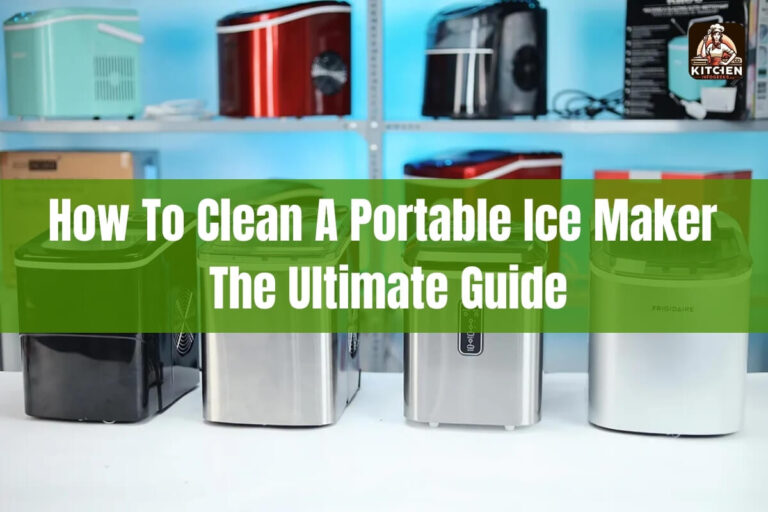
Is your ice maker disturbing your peace with strange noises? A noisy ice maker can stem from various issues, ranging from simple wear and tear to more complex mechanical problems. In this complete guide, we’ll explore the reasons behind ice maker noise, how to fix it, and ways to keep your appliance running smoothly and quietly.
Ice Maker Noises
Normal vs. Abnormal Sounds
Ice makers aren’t entirely silent appliances. They naturally produce some sounds during operation. But how can you tell if the noise is normal or a sign of trouble?
Normal ice maker sounds include:
- Soft humming from the motor
- Water flowing into the ice tray
- Clicking when ice is released
- Gentle thumping as ice drops into the bin
Abnormal noises that might indicate a problem:
- Loud grinding or scraping
- Persistent buzzing or rattling
- Banging or knocking sounds
- High-pitched whining
Common Types of Ice Maker Noises
Let’s break down some specific noises you might hear from your ice maker:
- Humming: A low hum is usually the sound of the compressor working. If it becomes louder than usual, it could signal an issue.
- Buzzing: This often occurs when water enters the ice maker. Excessive buzzing might mean a problem with the water inlet valve.
- Clicking: You’ll hear this when the ice maker ejects ice cubes. Frequent or loud clicking could indicate a mechanical issue.
- Knocking or Banging: These sounds might mean loose components or problems with the water supply.
Common Causes of Noisy Ice Makers
Water Supply Issues
Many ice maker noises trace back to water-related problems:
- Low water pressure: This can cause the ice maker to work harder, producing unusual sounds.
- Clogged water lines: Blockages can lead to gurgling or sputtering noises.
- Loose water connections: These often result in rattling or vibrating sounds.
To check for water supply issues:
- Ensure your water pressure meets the manufacturer’s recommendations.
- Inspect water lines for kinks or blockages.
- Tighten any loose connections.
Mechanical Problems
Mechanical issues often lead to the loudest and most concerning noises:
- Worn-out motor: A failing motor might produce grinding or buzzing sounds.
- Faulty fan: A damaged fan can cause scraping or rattling noises.
- Malfunctioning pump: This can result in loud humming or buzzing.
Ice Build-up and Frost
Excessive ice or frost accumulation can cause various noises:
- Cracking sounds as ice expands
- Scraping noises when the ice maker tries to eject frozen cubes
- Rattling from loose ice chunks
Regular defrosting and cleaning can prevent these issues.
Troubleshooting a Noisy Ice Maker
Identifying the Source of the Noise
To fix a noisy ice maker, first pinpoint where the sound is coming from:
- Listen carefully to determine if the noise is from the ice maker itself or nearby components.
- Try to isolate when the noise occurs (during water filling, ice ejection, etc.).
- Check if the noise changes when you adjust settings or open the freezer door.
Quick Fixes for Minor Issues
Some noise problems have simple solutions:
- Level the refrigerator: An uneven appliance can cause vibrations and rattling.
- Clear ice buildup: Remove any visible frost or ice chunks.
- Tighten loose parts: Check for and secure any loose screws or components.
- Clean the ice maker: Regular cleaning can prevent many noise issues.
When to Call a Professional
While many ice maker noises have DIY solutions, some require expert help:
- If you hear grinding or loud mechanical noises
- When there’s a burning smell along with the noise
- If you’ve tried basic troubleshooting without success
- For any repairs involving electrical components or refrigerant
Fixing Specific Ice Maker Noise Problems
Loud Humming or Buzzing
A noisy hum or buzz often points to these issues:
- Faulty water inlet valve: This valve controls water flow into the ice maker. A malfunctioning valve can buzz loudly.
Fix: Replace the water inlet valve. It’s a relatively simple DIY job for most models.
- Struggling compressor: If the compressor is working too hard, it can produce a loud hum.
Fix: Check for proper ventilation around your fridge. If the problem persists, you may need a professional to inspect the compressor.
Clicking or Knocking Sounds
These noises usually relate to the ice-making cycle:
- Ice stuck in the mold: This can cause repeated clicking as the machine tries to eject it.
Fix: Manually remove the stuck ice and check for any obstructions in the ejector mechanism.
- Loose or damaged components: Knocking sounds often mean something’s come loose.
Fix: Inspect the ice maker for any visibly loose parts and tighten them. If you can’t find the source, it’s best to call a technician.
Grinding or Scraping Noises
These are often the most concerning sounds:
- Damaged fan blades: A bent fan blade can scrape against nearby surfaces.
Fix: Inspect the fan for visible damage. If you spot any, replace the fan assembly.
- Worn-out motor bearings: This can cause a grinding noise as the motor runs.
Fix: Motor replacement is usually necessary. This job is best left to professionals.
Maintaining a Quiet Ice Maker
Regular Cleaning and Maintenance
Keep your ice maker running smoothly with these tips:
- Clean the ice bin monthly with mild soap and warm water.
- Sanitize the system every 3-6 months using a mixture of water and vinegar.
- Replace the water filter as recommended by the manufacturer.
- Check and clean the condenser coils annually.
Proper Installation and Leveling
A well-installed ice maker is less likely to make noise:
- Ensure your refrigerator is level. Use a bubble level to check and adjust the feet as needed.
- Leave adequate space around the fridge for proper ventilation.
- Use appropriate water line materials (avoid plastic tubing if possible).
Replacing Worn-out Parts
Don’t wait for parts to fail completely:
- Replace the water inlet valve every 5-7 years.
- Check and replace door gaskets if they’re worn or damaged.
- Consider replacing the entire ice maker unit after 10-15 years of use.
Choosing a Quiet Ice Maker
If you’re in the market for a new ice maker, consider these factors for quiet operation:
Features to Look for in Low-Noise Models
- Insulated ice bins to muffle dropping ice sounds
- Slow-close bin drawers to prevent slamming
- Advanced compressor technology for quieter operation
- Rubber mounting to reduce vibration
Top Brands Known for Quiet Operation
While individual experiences may vary, these brands often receive praise for their quiet ice makers:
- Sub-Zero
- Bosch
- LG
- Whirlpool
- GE Profile
Research specific models and read user reviews to find the quietest option for your needs.
FAQs About Noisy Ice Makers
How often should I clean my ice maker?
Clean the ice bin monthly and sanitize the system every 3-6 months.
Can a noisy ice maker be a sign of a serious problem?
Yes, especially if you hear grinding or loud mechanical noises. These could indicate issues with the motor or compressor.
Is it normal for an ice maker to make noise when dropping ice?
Yes, some noise when ice drops is normal. However, if it’s excessively loud or frequent, there might be an issue.
Can low water pressure cause ice maker noise?
Yes, low water pressure can cause the ice maker to work harder, potentially leading to unusual noises.
How long do ice makers typically last?
With proper maintenance, most ice makers last 10-15 years.
Conclusion: Enjoying Silent Ice Production
A noisy ice maker doesn’t have to be a permanent problem. By understanding the causes of ice maker noise and taking proactive steps to maintain your appliance, you can enjoy quiet, efficient ice production for years to come. Remember, regular cleaning, proper installation, and timely repairs are key to keeping your ice maker in top shape. If you’re still struggling with a noisy ice maker after trying these solutions, don’t hesitate to consult a professional appliance technician. With the right care and attention, your ice maker can be a silent partner in keeping your drinks cool and refreshing.






